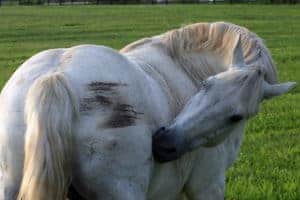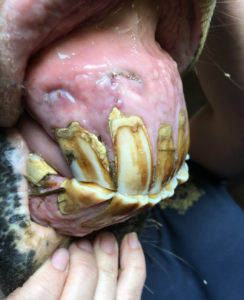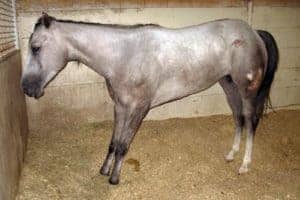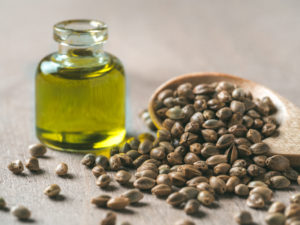Latest News – The Horse

Equine Self-Mutilation
There are at least three distinct types of self-mutilative behavior in horses. Here’s what researchers know about them and how management changes and other options can help reduce their frequency.

Are We Overlooking EOTRH in Senior Horses?
Veterinarians have only recently described this dental disorder, which primarily affects older horses’ incisors and canines. Because EOTRH comes on slowly and insidiously, many owners and their vets don’t pick up on it until it’s in its late—and painful—stages, one equine dental specialist says.

How to Manage Laminitis Pain on the Farm
Each horse responds to laminitis differently, so veterinarians must have a variety of pain-management options at their disposal.

Epinephrine Prolongs, Intensifies Hoof Nerve Blocks in Horses
Horses treated with lidocaine and epinephrine remained sound for longer and had decreased skin sensation compared to those that were blocked with lidocaine alone.

Hemp for Horses: Safety and Uses
Hemp oil, hemp meal, CBD, and THC all come from similar—and sometimes the same—plants and are becoming more popular as cannabis and industrial hemp regulations loosen. Learn how nutritionally rich hemp might help your horse.

Anesthetizing Mules, Miniature Horses, and More
When it comes to putting equids such as mules and Miniature Horses under general anesthesia, veterinarians must factor in those animals’ physical and behavioral differences.

UK Graduate Student Spotlight: Staci McGill
Staci McGill’s research projects focus on how ventilation, air quality, and air movement impact horses.

Preventing Water Pollution on Your Horse Farm
Get tips and information on horse farm water-quality issues, creating a water and soil conservation and nutrient management plan, and accessing resources available to help landowners comply with agricultural water quality acts.

Nielsen Works to Improve Equine Parasitology Understanding Worldwide
Dr. Martin Nielsen recently completed a sabbatical in New Zealand where he worked to help improve the understanding of equine parasites in that country.

Insect-Borne Equine Diseases: Q&A
Find answers to questions about equine infectious anemia, Potomac horse fever, parasites, and more.

Hair Loss in Horses
Hair loss in horses can be a frustrating management concern simply because the reasons for its occurrence are so many and so varied. Here are some common causes.

Equine Research Opportunities for Undergraduate Students
Undergrads at the University of Kentucky can take part in equine research on topics including nutrition, parasitology, facility design, racetrack surfaces, endocrinology, immunology, musculoskeletal science, plant and soil science, and more.

Who’s Involved With Horses? Researchers Want to Find Out
Researchers are hoping equestrians will reply to an online research survey aimed at helping them better understand who participates in horse activities and sports.

EIA, Coggins Tests, and Protecting Your Horse
Why are there so many equine infectious anemia cases in the news, and how can you protect your horse from this deadly disease?

Mind the Gap: Feeding the Toothless Horse
If your senior horse has few to no teeth, he might not be chewing and digesting the nutrients he needs to maintain his health.

Bringing Home a New Horse
Remember these tips to help your horse’s transition from his old home to his new one go smoothly.











